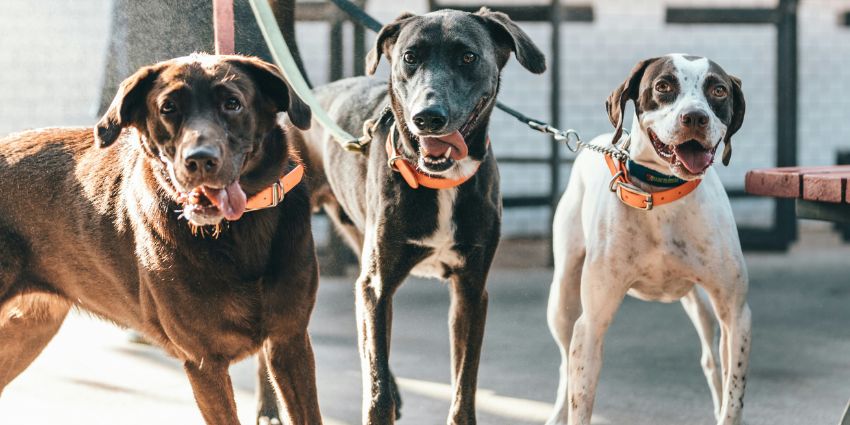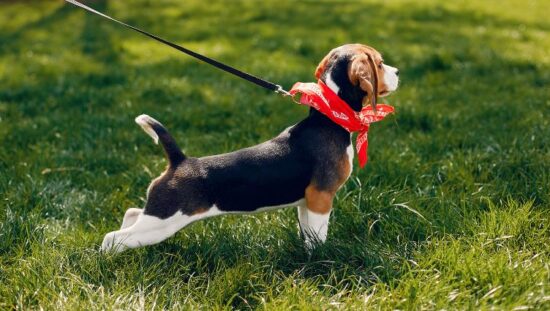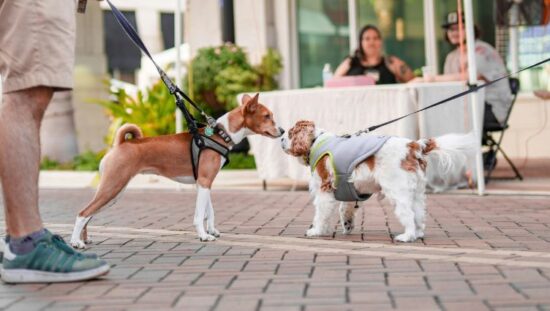When it comes to hunting, having the right dog can make a big difference. Hunting dogs aren’t just pets; they are skilled partners with special talents for hunting.
In this blog, we’ll look at some of the best hunting dog breeds and what makes them great. We’ll also cover how to train and care for them. Whether you’re an experienced hunter or just getting started, knowing about these breeds and how to support their skills will help you have a successful hunting experience.

Characteristics of Great Hunting Dogs
Great hunting dogs have specific characteristics that make them excellent partners in the field. Here are some key traits to consider when choosing a hunting dog:
1. Key traits to look for in hunting dogs
When choosing a hunting dog, some traits are especially important. Intelligence is key because a smart dog can learn commands quickly and understand the different tasks needed during a hunt.
Stamina is also important; hunting can take a long time and involve rough terrain, so a dog needs the energy to keep going without getting tired. Also, trainability is vital. A dog that is easy to train will follow commands well, which makes the hunting experience smoother and more enjoyable for both the dog and the hunter. Together, these traits help create a reliable and effective hunting partner.
2. Importance of breeding and genetics
Breeding and genetics are very important when it comes to hunting dogs. Dogs that come from a line of good hunters are more likely to have the natural skills needed for hunting. This includes things like a strong sense of smell, a good temperament, and the right body type for the job. When breeders focus on these traits, they help ensure that the puppies inherit the qualities that make them great hunting dogs. So, choosing a dog from a well-bred line can give you a better chance of having a successful hunting companion.
Top Breeds for Hunting
Different dog breeds have unique qualities that make them great for hunting. Here are some top breeds and what makes them stand out:
1. Labrador Retriever
Traits and skills:
Labrador Retrievers are known for being friendly and outgoing, which makes them easy to work with. They are very intelligent and quick learners, which helps them follow commands and quickly learn new skills. Labs are hard workers and are eager to please, so they are easy to train. They are strong and athletic, which helps them manage long hunts. They also have a great sense of smell and are natural retrievers, making it easy for them to find and bring back the catch efficiently.
Types of game they are best suited for:
Labrador Retrievers are especially good at retrieving water birds like ducks and geese because they are strong swimmers and love being in the water. They are also great for hunting upland birds, like pheasants and quail, because of their strong sense of smell and retrieving abilities.
Their versatility makes them an excellent choice for different hunting activities, whether in the field or water.
German Shorthaired Pointer
Traits and skills:
German Shorthaired Pointers are known for being energetic, smart, and versatile. They have a strong sense of smell and are great at pointing, which helps them find and signal where the catch is for hunters. These dogs are easy to train and respond well to commands, which makes them great for many different hunting tasks. Their strong build and energy let them handle long hunts. They are eager and reliable partners.
Types of game they are best suited for:
German Shorthaired Pointers are great for hunting many different animals. They are particularly effective for bird hunting, including pheasants, quail, and grouse, because of their pointing and retrieving skills. They are also good for hunting small animals like rabbits. Their adaptability and strong work ethic make them good for hunting both land and water animals.
Beagle
Traits and skills:
Beagles are known for their friendly and curious nature. They have a strong sense of smell and excellent tracking abilities, which makes them great at following scents. Beagles are smaller in size but very determined and persistent, which helps them stay focused during hunts. They are also smart and can be trained to follow commands and work well in the field. They are playful and energetic, and that makes them enjoyable companions, though they can be a bit stubborn at times.
Types of game they are best suited for:
Beagles are particularly effective for hunting small animals like rabbits and hares. Their strong sense of smell helps them track these animals well. They are also used for hunting other small animals such as squirrels and birds. Because of their size and tracking skills. Beagles are great at hunting where following scents and being persistent are important.
Golden Retriever
Traits and skills:
Golden Retrievers are known for being friendly and gentle, making them great companions in the field. They are highly intelligent and eager to please, which makes training easy and effective. Their strong retrieving instincts are a key trait; they are good at fetching and bringing animals back to their owners. Golden Retrievers have a strong build and good stamina, which helps them manage long hunts. They also have a sharp sense of smell, which helps them find animals quickly.
Types of game they are best suited for:
Their strong swimming and love of water make them great for hunting ducks and other water birds. They are also great for hunting birds like pheasants and quail because they are good at bringing them back. Their adaptability and friendly nature make them a good fit for many different types of hunting.
American Foxhound
Traits and skills:
American Foxhounds are known for their great endurance and strong sense of smell. They are friendly and full of energy, which makes them perfect for long hunting days. They are very good at tracking scents over long distances thanks to their powerful noses and determination. They are independent and can work alone, but they also respond well to training. Their strong build helps them move easily over different types of terrain.
Types of game they are best suited for:
American Foxhounds are particularly effective for hunting larger animals such as foxes and deer. Their stamina and tracking skills are great for following these animals over long distances. Their ability to work with other dogs makes them good for hunts that require teamwork.
English Springer Spaniel
Traits and skills:
English Springer Spaniels are known for their friendly and enthusiastic nature. They are very energetic and have a strong drive to work, which makes them excellent hunting companions.
These dogs are good at finding and flushing out animals with their sharp sense of smell and lots of energy. They are also great at bringing back what they find. They are smart and eager to please, so they respond well to training and can handle different hunting tasks.
Types of game they are best suited for:
English Springer Spaniels are particularly good for upland bird hunting, including pheasants, quail, and grouse. Their ability to push birds out of thick areas makes it easier to shoot them. They are also good at retrieving water birds because they swim well and love water. Their skills and drive make them great for hunting both on land and in water.
Weimaraner
Traits and skills:
Weimaraners are known for their unique look and great hunting skills. They are very energetic, and smart, and have a strong desire to work, making them excellent hunting partners. They have a sharp sense of smell and are good at tracking and finding animals. They are also quick and have the stamina for long hunts. Their strong retrieving instincts and eagerness to please make them easy to train and effective in different hunting tasks.
Types of game they are best suited for:
Weimaraners are versatile hunters and do well in many types of hunting. They are especially good at hunting birds like pheasants and quail because they can point and retrieve well. They are also effective at tracking and bringing back larger animals like deer and wild boar. Their energy and adaptability make them great for hunting both small and large animals in various places.
Training Tips for Hunting Dogs
Training your hunting dog is important for a successful hunting experience. Here are some basic tips to help you get started:
- Basic obedience training: Start with basic commands like “sit,” “stay,” and “come.” These commands help your dog listen to you and behave well in different situations. Practice these commands regularly to ensure your dog responds quickly.
- Specific training for hunting tasks: Once your dog knows basic commands, focus on hunting-specific skills. Teach your dog to track scents, point out animals, and retrieve items. Use real hunting scenarios if possible, or practice with training dummies to simulate the hunting experience.
- Socialization and exposure to hunting environments: Expose your dog to different environments and situations it will encounter while hunting. This includes being around other dogs, different types of animals, and various terrains. Socialization helps your dog stay calm and focused during hunts.
- Use of positive reinforcement: Encourage good behavior by rewarding your dog with treats, praise, or playtime. Positive reinforcement helps your dog learn faster and strengthens its bond with you. Always reward your dog right after it does what you want to help it learn better.
Health and Care for Hunting Dogs
Taking care of your hunting dog is important to keep them healthy and performing well.
Here’s how you can keep your hunting dog in top shape:
- Nutrition and diet for active hunting dogs: Hunting dogs need a balanced diet to maintain their energy levels and overall health. Give them high-quality dog food that’s rich in protein and fat to support their active lifestyle. They may need more calories than a typical pet dog because of their intense physical activity. Always ensure they have access to fresh water to stay hydrated.
- Regular exercise and conditioning: Regular exercise is essential for keeping your hunting dog fit and ready for action. In addition to daily walks and playtime, include activities that mimic hunting conditions, like running and retrieving. This helps build their stamina and keep their muscles strong. Proper conditioning keeps your dog safe from injuries and helps them handle long hunts.
- Common health issues and preventive care: Be aware of common health issues that can affect hunting dogs, such as joint problems, ear infections, and parasites. Regular vet check-ups can help catch these issues early. Keep your dog’s ears clean and dry, and check for ticks and fleas after outdoor activities. Also, make sure they are up-to-date on vaccinations and preventive treatments. Proper grooming and regular dental care are also important to their overall health.
Hunting Gear and Accessories
Giving your hunting dog the right gear is important for their safety and success. Here’s what you need:
Essential gear for hunting dogs:
- Vests: A good hunting vest protects your dog from harsh weather, brush, and potential injuries. Brightly colored vests, often in orange or yellow, increase visibility, making it easier for you and others to spot your dog in the field.
- Collars: Durable, adjustable collars are important for identifying your dog and ensuring they can be easily controlled. Some collars come with reflective materials for added visibility.
- GPS Trackers: GPS trackers let you see where your dog is, especially in large or tricky areas. They help you find your dog if they wander off or get lost.
Safety equipment and considerations:
- First aid kit: Carry a basic first aid kit for your dog, including items like bandages, antiseptic, and tweezers. This helps you deal with minor injuries or problems on the spot.
- Boots: Dog boots protect their paws from rough terrain, sharp objects, and extreme temperatures. They are especially useful on rocky or icy ground. However, even if your hunting dog wears boots, it’s still important to keep their paws healthy and strong. Check out our article on Essential Paw Pad Care for Dogs: Tips for Healthy Paws or tips on keeping their paws in top shape for hunting trips.
- Water and hydration: Always bring enough water for your dog to stay hydrated. A portable water bowl or a hydration pack designed for dogs can be handy.
- Reflective gear: For hunting in low light conditions, reflective gear or lighting can help keep your dog visible to you and others.
Conclusion
Picking and taking care of a hunting dog means understanding each breed’s special traits and needs. Whether you choose a Labrador Retriever, German Shorthaired Pointer, Beagle, Golden Retriever, American Foxhound, English Springer Spaniel, or Weimaraner, each breed brings unique skills to your hunt.
Good training, including basic commands, hunting tasks, and socializing, is key to a successful hunting dog. Regular exercise, a healthy diet, and preventive care are important for keeping your dog in great shape. Also, having the right gear, like vests, collars, GPS trackers, and safety equipment, keeps your dog safe and effective in the field.
By focusing on these things, you’ll not only make your hunts more successful but also strengthen your bond with your dog, making each hunting trip more enjoyable.



